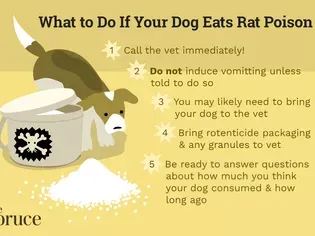Rat Poisoning in Dogs
Updated on 04/26/24

Rat Poisoning in Dogs: A Comprehensive Guide for Concerned Pet Owners
Rat poisoning is a serious threat to dogs, posing potentially life-threatening consequences if not promptly addressed. Understanding the causes, symptoms, and treatment options is crucial for every dog owner to safeguard their beloved companion's well-being.
Understanding Rat Poison
Rat poisons are chemical substances formulated to kill rodents. They come in various forms, including pellets, blocks, and liquids, and can be found in households, commercial buildings, and even outdoor areas.
Types of Rat Poisons
There are two main types of rat poisons:
* Anticoagulants: These poisons interfere with the blood's clotting mechanism, causing internal bleeding. Examples include warfarin, brodifacoum, and bromadiolone.
* Cholecalciferol (Vitamin D3): This poison causes excessive calcium absorption, leading to organ damage, calcification, and potential kidney failure.
Causes of Rat Poisoning in Dogs
Dogs can ingest rat poison through various means, such as:
* Consuming contaminated food or water
* Chewing on rat baits or traps
* Coming into contact with poisoned rodents (e.g., dead rats)
Symptoms of Rat Poisoning in Dogs
The symptoms of rat poisoning in dogs can vary depending on the type of poison ingested and the amount consumed. However, some common signs include:
* Anticoagulant poisoning:
* Lethargy
* Weakness
* Pale gums
* Blood in urine or feces
* Nosebleeds
* Cholecalciferol poisoning:
* Vomiting
* Diarrhea
* Abdominal pain
* Tremors
* Stiffness
Diagnosis and Treatment of Rat Poisoning
If you suspect your dog has ingested rat poison, it is crucial to seek immediate veterinary attention. The veterinarian will perform a physical examination, obtain a detailed history, and may recommend the following tests:
* Blood tests to assess clotting ability and calcium levels
* X-rays to check for internal bleeding or calcification
* Urinalysis to detect blood or other abnormalities
Treatment for rat poisoning depends on the type of poison ingested and the severity of the condition. It may involve:
* Administering vitamin K1 for anticoagulant poisoning to counteract the effects on clotting
* Induced vomiting or gastric lavage to remove unabsorbed poison from the stomach
* Fluid therapy to support the body's organs
* Anti-seizure medications or pain relievers as needed
Prevention of Rat Poisoning
Preventing rat poisoning in dogs is essential to protect their health. Here are some proactive steps you can take:
* Store rat baits securely: Keep all rat poisons out of reach of dogs and other pets.
* Use tamper-proof bait stations: This helps prevent dogs from accessing poisoned bait.
* Dispose of poisoned rodents properly: If you find a dead rat on your property, wear gloves and dispose of it safely by double-bagging it and throwing it away in a sealed container.
* Encourage proper pet behavior: Train your dog to avoid ingesting unfamiliar substances and never feed them near areas where rat poison may be present.
* Contact your veterinarian promptly: If you suspect your dog has ingested rat poison, seek veterinary attention immediately.
Additional Tips for Concerned Pet Owners
* Be observant: Monitor your dog's behavior and surroundings for any signs of potential poison exposure.
* Educate yourself: Research different types of rat poisons and their potential dangers to dogs.
* Keep an emergency contact list: Have the phone number of your veterinarian, a 24-hour animal poison control center, and a local emergency animal hospital readily available.
* Stay calm: While rat poisoning can be a serious concern, remaining calm and taking prompt action can significantly increase your dog's chances of a successful recovery.
Conclusion
Rat poisoning is a serious health threat to dogs, requiring immediate veterinary attention. Understanding the causes, symptoms, and treatment options is critical for every pet owner. By taking proactive prevention measures and seeking professional help promptly, you can safeguard your beloved companion's well-being and ensure their long-lasting health and happiness.
Explore More Pets

Basic Training
Puppy and Baby Introductions

Working Dog Breeds
All About Search and Rescue Dogs

Dog Treatments
Puppy Vaginitis: Signs, Causes and Treatment

Dog Adoption
After More Than 1,200 Days in the Shelter, Coco Goes Home

Basic Training
How to Train Your Puppy to Go on Potty Pads

Hybrid Dog Breeds
The Difference Between a Mutt, Mixed Breed, or Designer Dog?

Dog Treatments
Nail Problems in Dogs

Puppies
7 Reasons Why Two Dogs Are Better Than One